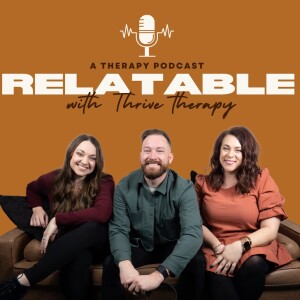
Monday Nov 11, 2024
EP 48: Self Care
In this episode, we’re digging into the real meaning of self-care—beyond the luxury spa days and indulgent treats. True self-care is about supporting your mental and physical energy so you can show up effectively for yourself and others. We'll explore how self-care is a proactive practice that keeps us within our “window of tolerance,” avoiding burnout and stress overload. We’ll unpack why this isn’t selfish, the surprising ways boundaries fit into self-care, and practical strategies to recognize when you’re nearing your limit. Tune in for analogies, real-life examples, and insights into making self-care a sustainable, essential part of life.
Self Care
What is self care: Self care can be preventative or responsive, but to simplify, it is caring for yourself. How we determine how or when we prioritize self care over sacrifice for others comes back to our window of tolerance. We all have a certain threshold, and to be within your tolerance, you need the front brain (prefrontal cortex) to still be online and accessible. When you get so stressed out, it causes you to go beyond that threshold of your tolerance level. Your front brain is going to go offline causing you to react in a fight, flight, freeze, or collapse manner.
Does practicing self care make you selfish: Imagine you as a car. You are wanting to get from Arizona to California without having to stop for gas, however the reality is if your car runs out of gas it doesn’t matter if you know where you are going, the way to get there, but you are still going to have to stop and fill up with gas even if it feels inconvenient to stop. If you don’t stop for gas (or to practice self care), you aren’t going to get where you need to go. In your life, the consequences of not making time for self care is: burnout, inability to manage life/stress, can’t prioritize relationships, etc.
Proactive vs Reactive Self Care: A great form of proactive self care are boundaries. The more we set up intentional structures in this proactive way, the less we have to tell others “no”. For example: telling people what they can expect with how you manage your schedule. By saying something such as “Hey I only have these days and these times” you are likely going to say “no” less because you are communicating what times you DO have available. Reactive self care is when the tank is getting empty, and I am getting cues that I am getting to the edge of my window. How can I react or keep myself in my window, in this moment, when something stressful is happening. This can look something like box breathing, diffusing essential oils, or going on a walk to take yourself out of the situation.
Some people struggle with self care for a number of reasons: boundaries are hard, they don’t want to disappoint/upset someone else, it has never been modeled for them, etc. Overall, self care is so much more than doing stuff that is luxurious and fun for you. It is more about how we are managing our energy well enough so we can stay healthy and function optimally.
No comments yet. Be the first to say something!